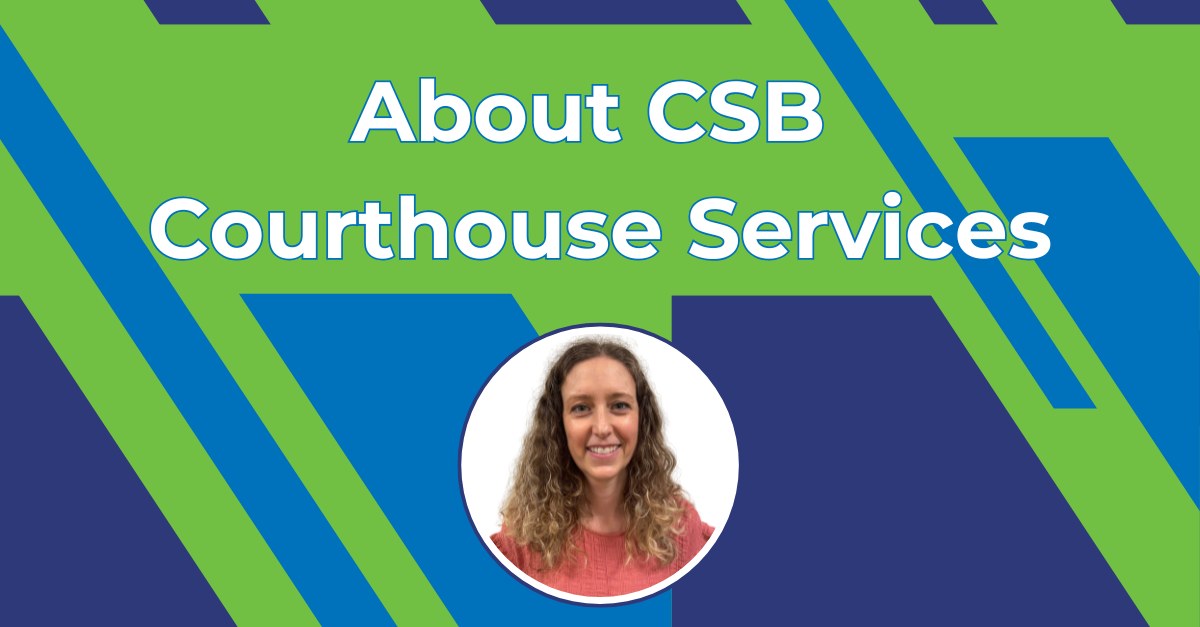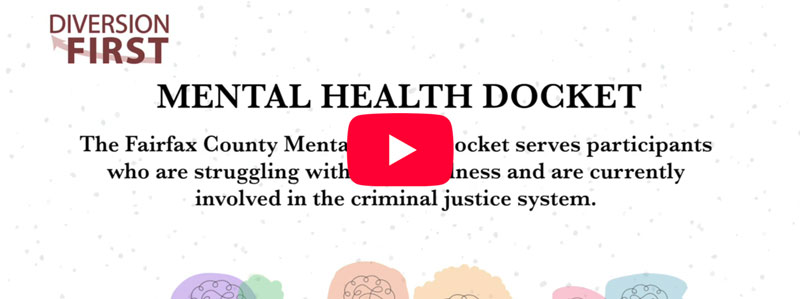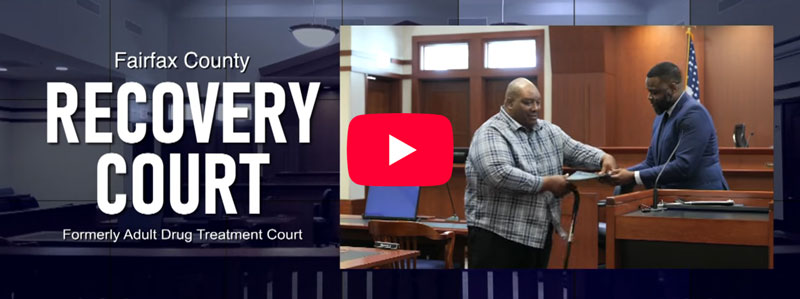Specialty dockets combat stigma by recognizing that substance use challenges and mental illness are not crimes. Through collaboration and the dedication of multiple agencies, these courts offer compassionate, effective alternatives to incarceration.
- Martha Dunn-McCue, CSB Courthouse Services Behavioral Health Manager
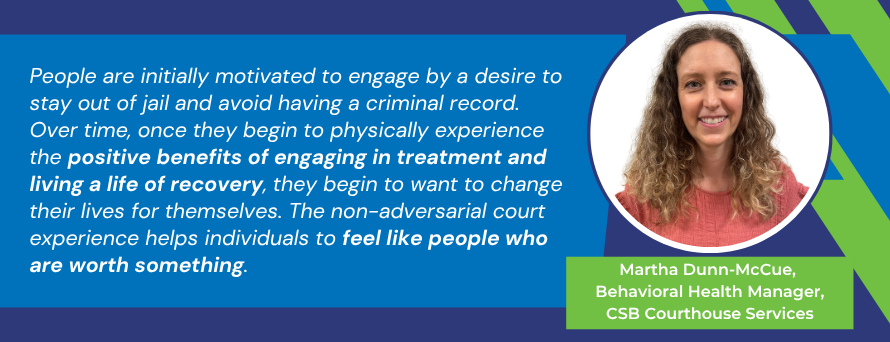
About CSB Courthouse Services
The CSB’s three specialty courts — Recovery Court, Veterans Treatment Docket, and the Mental Health Docket — offer a compassionate, collaborative alternative to traditional approaches. Focused on treatment over punishment, these voluntary programs support individuals facing mental illness, substance use challenges, or developmental disabilities, who come into the criminal justice system. They recognize that criminal behavior can stem from untreated or undiagnosed conditions.
In addition to directly staffing the docket teams, the CSB acts as a treatment provider for many participants of the Specialty Dockets. Participants are involved in various CSB programs including residential treatment, Behavioral Health Outpatient Programs, the Addiction Medicine Clinic, Turning Point, Intensive Case Management and Assertive Community Treatment.
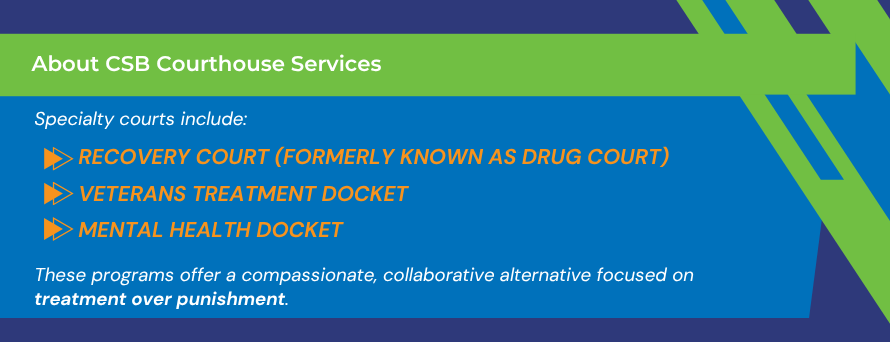
Who in the community is eligible?
Adults who have pending charges in Fairfax County and have serious mental health and/or substance use treatment needs and are at high risk of ongoing criminal recidivism if their behavior health needs are not met.
To be eligible for most of the dockets an individual must have high criminogenic risk, high treatment needs and meet the following criteria:
-
Individuals with charge(s) in Fairfax County.
-
Event(s) that lead to the charge(s) were the result of symptoms associated with an underlying substance use disorder (SUD) or serious mental illness (SMI).
-
Individuals assessed to meet high risk of criminal recidivism and high treatment needs by a validated assessment tool. [Veterans Docket also has a low criminogenic risk/high treatment need track.]
-
Office of the Commonwealth Attorney approves for legal eligibility.
-
Individuals must be willing to undergo intensive treatment and supervision for their SUD or SMI as opposed to following the traditional approach to the legal process in exchange for reduced or dismissed charges at program completion.
-
For Recovery Court and the Mental Health Docket, individuals must be a Fairfax County Resident.
How do you access this service and where do you go to get help?
Individuals who have pending charges in Fairfax County can be referred by anyone including CSB treatment providers. Most of the docket referrals come from defense attorneys but other referral sources including judges, police officers, magistrates, even individuals themselves.
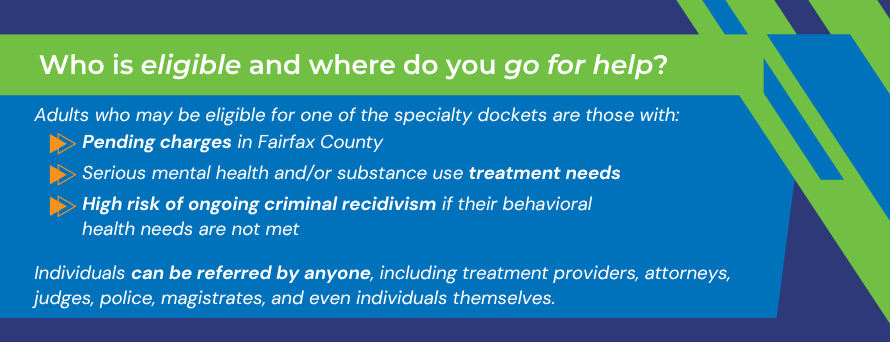
What is the outcome or improvement on people’s lives after they’ve received this service?
Specialty dockets combat stigma by recognizing that substance use challenges and mental illness are not crimes. Through collaboration and the dedication of multiple agencies, these courts offer compassionate, effective alternatives to incarceration. The result: fewer repeat offenses, improved public safety, smarter use of resources, a healthier community, and, most importantly, support for individuals in crisis to recover and regain control of their lives.
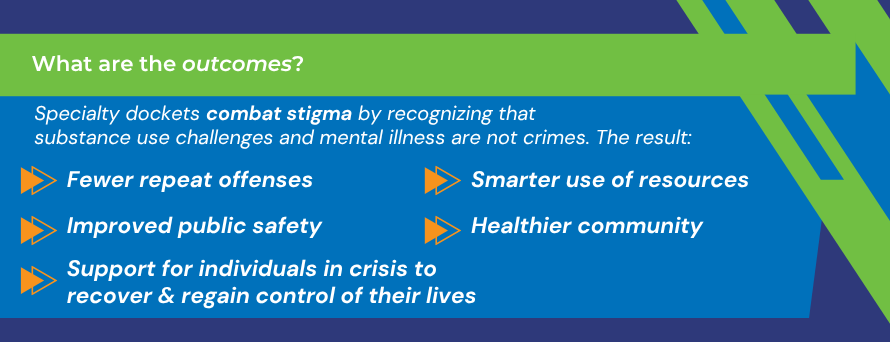
What practices have proven most effective in engaging participants and supporting long-term success?
These courts connect participants with behavioral health treatment, case management, and other community-based services as part of their court-mandated plan. However, gaps remain in timely access to housing, long-term treatment options, and culturally responsive services. Individuals typically resistant to treatment choose to engage in these programs due to the legal incentive. If they complete the program their charge(s) will be dismissed or significantly reduced.
People are initially motivated to engage by a desire to stay out of jail and avoid having a criminal record. Over time, once they begin to physically experience the positive benefits of engaging in treatment and living a life of recovery, they begin to want to change their lives for themselves. The non-adversarial court experience helps individuals to feel like people who are worth something. The wraparound supports provided link people to their specific needs such as assistance with food and shelter, parenting and childcare resources, employment support, medical care, benefits, peer support, and community groups. These help participants build stronger recovery capital so that they can successfully break patterns that have historically kept them cycling in and out of the criminal justice system, and be able to maintain their recovery after graduation from the docket.
How do you ensure that specialty court dockets operate equitably and do not unintentionally reinforce disparities across race, income or disability status?
Courts are tracking demographic outcomes, offering interpretation services and partnering with culturally specific providers. Still, systemic disparities require ongoing attention and reform. The Specialty Dockets follow national best practice guidelines established by All Rise (formerly National Association of Drug Court Professionals). One of the best practice standards for evaluation is to monitor for unintentional disparities. The team tracks data, which is submitted to the state specialty docket team as well as a contracted independent evaluator for review on a quarterly basis. We are provided with feedback on if there are any disparities in the acceptance rate into the docket as well as graduation rates.
"Recovery courts take into consideration if you can get this person stable and get them the resources before they leave, it is likely going to prevent them from coming back in contact with the criminal justice system. It is very important because it is very smart on crime and is actually helping our recidivism rate. It is making us safe and it’s along changing the way that people view the criminal justice system overall." — Honorable Judge Bugg, Fairfax County District Court
Could you share a success story?
An individual never imagined they’d end up in the criminal justice system. Diagnosed with Bipolar I Disorder in their early 20s, they had long managed their illness with medication, therapy, and family support. They were thriving — a devoted parent, successful in their job, and grounded in a full life. But when a change in insurance made their medication unaffordable, they stopped taking it, thinking they’d be okay. Within weeks, they spiraled into a manic and psychotic episode, losing their job, home, custody of their children and, ultimately, facing serious criminal charges.
Instead of traditional prosecution, they were offered a chance through the Mental Health Docket: intensive treatment, supervision and regular court check-ins with the promise that their charges would be dismissed upon successful completion. At first, they were overwhelmed and full of shame. But step by step, with the support of their team and the court, they began to rebuild. They found work, reconnected with their family, and rediscovered joy — even their sense of humor. By the end of their time in the program, they would have the whole courtroom howling with laughter as they shared jokes.
When they graduated, their charges were dismissed. Today, they are stable, actively engaging in treatment, have regained joint custody of their children, maintain stability, and work full time. As a proud graduate, they now support others in the program on their journey, proving that with the right help, recovery is possible.
For media inquiries, contact CSBCommunications@fairfaxcounty.gov.


